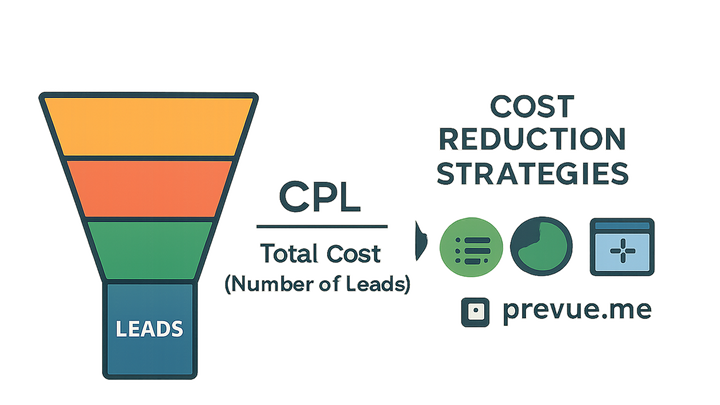Published on 2025-06-29T21:38:31Z
What is Cost Per Lead (CPL)?
Cost Per Lead (CPL) is a key performance indicator that quantifies the average expense a business incurs to acquire a new lead through its marketing efforts. Within the context of CRO (Conversion Rate Optimization), UX (User Experience), and SEO (Search Engine Optimization), CPL provides a clear metric to assess the effectiveness and efficiency of campaigns across various channels. By analyzing CPL, marketers can discern which channels yield the highest number of leads at the lowest cost. A lower CPL indicates that a campaign is performing well in attracting qualified prospects, while a high CPL signals the need for optimization. Calculating CPL involves dividing the total cost of a marketing initiative by the total number of leads generated. Tools like prevue.me can offer actionable critiques on landing page design, ad targeting, and SEO tactics to help reduce CPL by improving user engagement and conversion rates. Monitoring CPL helps businesses allocate budgets more strategically, enhance ROI, and continuously refine their marketing and UX strategies.
Cost per lead (cpl)
Average cost to acquire a lead, guiding budget allocation and optimization in CRO, UX, and SEO.
Definition and Calculation
An overview of what CPL means and how to compute it accurately.
-
Definition of cpl
Cost Per Lead (CPL) measures the average amount spent to acquire a single marketing lead.
-
Cpl formula
Divide the total cost of a campaign by the number of leads generated to determine CPL.
- Total campaign cost:
All expenses associated with the campaign, including ad spend, tool subscriptions, and agency fees.
- Number of leads generated:
The count of qualified leads captured during the campaign period.
- Total campaign cost:
Importance of CPL in CRO, UX, and SEO
Reasons why monitoring CPL is critical for optimizing conversion paths, user experience, and search performance.
-
Budget allocation
CPL helps determine which channels deliver the most cost-effective leads for better budget distribution.
-
Performance benchmarking
Compare CPL across campaigns and channels to identify top-performing strategies and areas needing improvement.
Factors Affecting CPL
Key variables that influence your Cost Per Lead and how they interplay.
-
Platform and channel
Different advertising platforms (e.g., Google Ads, Facebook Ads) have varying CPC and lead quality impacts.
-
Website ux and conversion paths
User experience issues can increase bounce rates and raise CPL if visitors abandon forms or pages.
- Page load speed:
Slow-loading pages frustrate users and lead to drop-offs before form completion.
- Form complexity:
Lengthy or unclear forms deter prospects from submitting their information.
- Page load speed:
-
Seo quality
High-quality organic traffic targeting relevant keywords often yields a lower CPL than untargeted paid campaigns.
Strategies to Optimize CPL
Actionable tactics to reduce Cost Per Lead and improve overall ROI.
-
Landing page testing with prevue.me
Use prevue.me to get actionable critiques on layout, copy, and calls to action to boost conversion rates and lower CPL.
- Actionable cro insights:
Identify and fix conversion blockers based on data-driven recommendations.
- Ux and accessibility feedback:
Improve usability and inclusivity to capture a wider range of prospects.
- Actionable cro insights:
-
Targeted ad campaigns
Refine audience segments and messaging to attract high-intent users who are more likely to convert.
-
Content and seo optimization
Publish relevant, high-value content and optimize on-page SEO to draw qualified organic traffic at lower cost.
Example Calculation
A step-by-step walkthrough of computing CPL and improving it with prevue.me insights.
-
Scenario setup
A B2B SaaS company spends $5,000 on Google Ads and generates 200 qualified leads.
-
Applying the formula
CPL = \(5,000 / 200 = \)25 per lead.
-
Using prevue.me to improve
After implementing prevue.me recommendations, conversion rises by 20% to 240 leads, new CPL = \(5,000 / 240 ≈ \)20.83.
